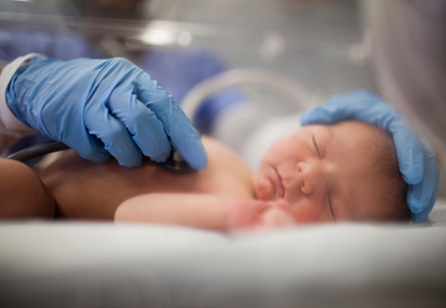From the Blog

In addition to the highly specialized care our clinicians provide to patients across the country every day, many also serve as go-to expert sources for top national and regional media outlets. Pediatrix® clinicians regularly contribute to news articles, sharing their expertise to help educate readers on popular and trending topics related to women’s and children’s health, as well as unique stories of innovative patient care.
Here’s a roundup of some of the latest stories:
Amber Chambers, CNM, certified nurse-midwife, spoke with The Bump about sleep aid use during pregnancy. She shared that pregnancy insomnia is caused by hormonal fluctuations, physical discomfort and stress. “My first-line treatments are generally lifestyle modifications or supplements before resorting to medications,” said Chambers. She recommended prenatal yoga, exercise, prenatal acupuncture, massage, cognitive behavioral therapy and magnesium supplements. If natural alternatives aren’t effective, Chambers spoke about what sleep aids are safe and unsafe to take during pregnancy.
Chris Klunk, M.D., neonatologist, spoke with Babylist about how to clean baby products to prevent the buildup of bacteria, mold and mildew. Dr. Klunk said it’s important to understand the difference between cleaning and sterilizing. “Cleaning is the removal of visible grime and grossness, a process that will probably remove a few germs,” he explained. “Disinfecting [and sterilizing] is a whole additional level of germ destruction that involves the use of even stronger germ-crushing solutions and products." When it comes to baby toys, he shared that washing is sufficient. "Plastic and silicone toys can often be cleaned in the dishwasher on the top rack, but it is important to make sure they don't contain batteries or fabrics.”
Zachary Hoy, M.D., pediatric infectious disease specialist, spoke with Parents about the use of vitamin A for the prevention and treatment of measles. He noted that the Centers for Disease Control and Prevention recommend that vitamin A be administered in severe cases of the measles, especially among children who are hospitalized. “Vitamin A stores in the body have been seen to drop in measles cases, so supplementation with appropriate doses of vitamin A can help make sure the immune system is optimized when a patient is infected with measles,” said Dr. Hoy.
Fadiyla Dopwell, M.D., developmental-behavioral pediatrician, spoke with HuffPost about the effects of screen time on babies and newborns. “Children don’t learn as well from two-dimensional images,” said Dr. Dopwell. If a baby is watching a screen, there’s not much processing or learning happening in their brain, especially when they are under 2, she explained. While it’s impossible to avoid exposing a baby to screens completely, she cautioned against binge-watching videos or shows while they are in the same room. “They’re constantly being stimulated by all of the noise, even if they’re not engaging with the show or not turning to it consistently.”
Jenelle Ferry, M.D., neonatologist, spoke with Women’s Health about how to dry up breast milk supply in preparation for weaning. “The length of time it takes for milk to dry up will vary based on how much your baby is feeding and how much milk you are producing,” said Dr. Ferry. “For many women, breast milk starts to naturally dry up,” she said. “This often mirrors the timeframe when a baby starts to self-wean.” Dr. Ferry noted that this may not happen quickly or without deliberate weaning for those who make more milk than their baby consumes.
Anushka Chelliah, M.D., maternal-fetal medicine specialist, spoke with Parents about a new study that found that COVID vaccination in early pregnancy did not cause any increase in birth defects in the babies of people who took the vaccine. Both the American College of Obstetricians and Gynecologists and the Centers for Disease Control and Prevention recommend the COVID vaccine for pregnant people. “COVID-19 infection can be associated with significant maternal and fetal risks during pregnancy, which can be associated with adverse maternal and fetal outcomes,” said Dr. Chelliah. She shared that for pregnant people, COVID infections are associated with severe illness, a high risk of hospitalization, ICU admission, respiratory complications, blood clots and an elevated risk of preeclampsia. “From a fetal and neonatal perspective, there is a higher risk of placental insufficiency resulting in growth restriction, stillbirth, risk of preterm birth and neonatal infection.”
Sarah Morrow, CNM, certified nurse-midwife, spoke with The Bump about low sex drive during pregnancy. “A normal pregnancy is physically, mentally and emotionally stressful,” said Morrow. “One of our stress hormones—cortisol—decreases the hormones that drive our desire for sex.” She recommended open communication to help cope. “When sex drives change, people often struggle with assumptions or assign blame to themselves,” explained Morrow. “Sharing what you’re experiencing and why you believe it’s impacting your libido gives your partner insight and prevents false narratives from forming and creating resentments.”
Robert Quillin, M.D., pediatrician, spoke with Babylist about first aid kits for babies and toddlers. He recommended storing a baby’s first aid kit in the nursery, and noted parents likely won’t have to worry about anything expiring as most items have an extended shelf life. “An infant is likely to outgrow the need for the items before the over-the-counter medications expire,” said Dr. Quillin. As the child grows, first aid kits should be updated. "The first aid kit changes as the child goes through stages of development and activity,” he explained. "A first aid kit for a newborn will not be the same as a first aid kit for an older child.”
To view additional news stories, visit the Pediatrix newsroom.
Members of the media, we invite you to view our multispecialty media panel and request an expert source.
Tags:
The latest from the Blog

Pediatrix Clinicians in the News
From the Blog

